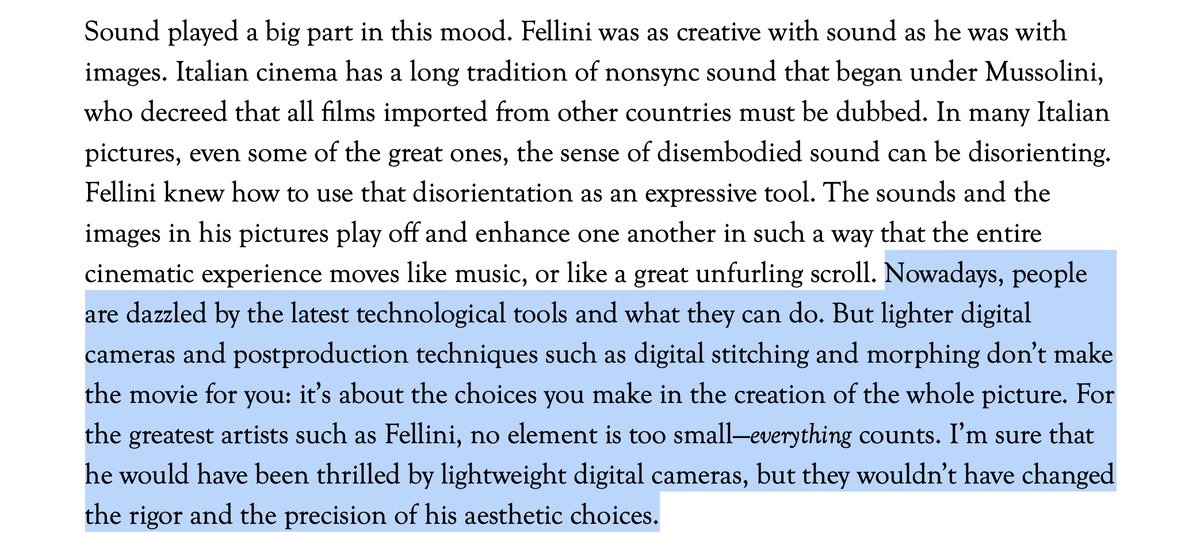The Scorsese piece on Harper's is many things.
A great read. A wonderful essay about Federico Fellini and his impact on the art form. A treatise against algorithms driving the movie business.
What it's not is a resistance to diverse filmmakers and streaming platforms.
A great read. A wonderful essay about Federico Fellini and his impact on the art form. A treatise against algorithms driving the movie business.
What it's not is a resistance to diverse filmmakers and streaming platforms.
In the piece, Scorsese makes clear that streaming platforms have been "good for filmmakers" including him. But the downside is that emerging talent, the type of diverse filmmaking he's wrongfully accused of dismissing, is getting overlooked in favor of echo chambers of content.
There's a fine point to be made here about the value of curation over algorithms. Specifically, engaging with films because they're advocated for by people we know and trust, not machine data with "recommendations based on what you've seen before."
There's certainly a dollar-and-cents type of value to algorithms pushing films on people that are a safe bet, but Scorsese's point is that we're losing the human touch of discovery. In the same way news and politics has become a fragmented media mess, so too is cinema.
The uncharitable read of this continues to be "Scorsese is upset people aren't watching movies in theaters anymore." I mean sure, it's clear he doesn't want that. Who does? But to go from that to him bemoaning change is uncouth, as this part of the essay addresses:
Everyone, all filmmakers, suffer from content remaining unchecked. Artistic voices get flushed out. People who live to recommend movies find themselves afraid to do so because their friends and loved ones have become primed to only watch a certain type of film on Netflix.
But the worst effect of this is what Scorsese somewhat implies in his piece. He mentions how neorealism was a cinematic force of good for post-war Italy in how it helped people reckon with the lingering effects of fascism. In 2021, will we experience anything remotely comparable?
We're now in the throes of a deadly pandemic and a rise of fascism across the globe, including the U.S. We'll undoubtedly receive films that confront these problems, but will anyone outside of film roundtables see them? Gain something from them? That's what Scorsese is grieving.
I do think Scorsese overstates how impactful film was on pop culture during Fellini's time. The most important films of the year will almost always lose out to loud crowd-pleasers, no matter the decade. But there is a material change, a downgrade to cinema's reach since the 60s.
A film like Nomadland, for example, is Chloe Zhao's undeniable statement on the American recession. It's a film that could inspire millions, but it will be ignored by far more. Not because they wouldn't love it, but because they don't know they would.
Because we rely on algorithms to do the work for us. That is what will kill cinema. Not streaming platforms or theaters closing their doors. People learning to tune out anything that *feels* outside of their comfort zone, assuming they hear about it at all.
It's why we have a whole generation of reactionary, ignorant movie bloggers who act like it's "gatekeeping" when you dare say it's important to watch and study films made before 1975. "Let people like what they like" is the de-facto, worm-brained straw man, and I'm so sick of it.
And it's not just filmmakers and studios losing cultural influence as curators. Critics, too, are dealing with a growing audience of people who see no need for them. Some say the critics deserve this for being snobs, but it's more complicated than that.
"content" is regularly shoveled to the masses and hailed by a small contingent of movie-adjacent influencers as something massive, artistic, and important. But often the broader film critique doesn't match that level of hype, and it makes audiences feel tricked.
We all know that pang of disappointment, which varies, when the consensus falls short of your own personal opinion. When you're told that what you like isn't "good actually." And something else that is "good actually" ends up being something you don't like at all.
So over time, general audiences feel resentment and distrust toward the institutions judging art. And it makes matters worse when said art is simplified down to a binary tomato rating on an aggregate movie platform that most people don't take the time to understand.
This (and many other related factors) forces critics to become people-pleasers instead of critics. Why go to the effort of making and marketing cinema when you can just rely on fans to lambast antagonist critics as gatekeepers who these films "just aren't for," right?

 Read on Twitter
Read on Twitter


